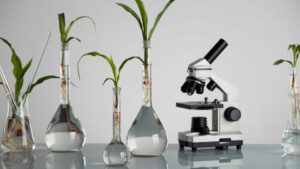Exploring the realm of environmental biotechnology opens doors to innovative solutions for today’s sustainability challenges. As I delve into this dynamic field, I uncover the intersection of biology, technology, and environmental science. From harnessing the power of microorganisms to remediate polluted sites to developing biofuels for a greener future, environmental biotechnology offers a promising path towards a more eco-friendly world.
In my journey through the landscape of environmental biotechnology, I aim to unravel the intricate ways in which living organisms can be harnessed to tackle environmental issues. By leveraging nature’s own mechanisms, we can revolutionize waste management, water purification, and renewable energy production.
Environmental Bio Technology
The Definition and Scope
In environmental biotechnology, I delve into the use of biological processes and ecosystems to develop technologies that can solve environmental issues. It’s all about leveraging the power of living organisms and their systems to create sustainable solutions for challenges like pollution control, waste management, and energy production. With a focus on harnessing nature’s own mechanisms, this field aims to pave the way for cleaner and more efficient environmental practices.
Historical Background and Evolution

Looking back at the roots of environmental biotechnology, I see a rich history of using biological principles to address environmental concerns. From early practices of using plants to clean contaminated soil to modern-day advancements in genetic engineering for environmental purposes, this field has evolved significantly over time. The integration of biology and technology has led to groundbreaking innovations that continue to shape the way we approach environmental sustainability.
Key Applications of Environmental Biotechnology
Waste Management and Bioremediation
In environmental biotechnology, one vital application is waste management and bioremediation. These processes involve utilizing biological organisms or their derivatives to break down pollutants and contaminants in the environment. For instance, the use of microbial consortia can effectively treat contaminated water and soil by degrading organic pollutants into harmless byproducts. Bioremediation offers a sustainable and eco-friendly approach to cleaning up environmental pollution, highlighting the importance of harnessing nature’s processes for a cleaner planet.
Renewable Energy Production
Another critical application of environmental biotechnology is in renewable energy production. By leveraging biological systems, such as anaerobic digestion or algae cultivation, to convert organic matter into biofuels like biogas or biodiesel, we can generate clean energy sources. These processes not only help in reducing reliance on fossil fuels but also contribute to mitigating greenhouse gas emissions, thereby promoting a greener and more sustainable energy landscape. Environmental biotechnology plays a key role in fostering renewable energy solutions for a cleaner future.
Pollution Detection and Monitoring
Environmental biotechnology also plays a pivotal role in pollution detection and monitoring. Advanced biotechnological tools, such as biosensors and genetic markers, enable real-time detection of pollutants in air, water, and soil. These technologies provide accurate and rapid assessments of environmental quality, aiding in early pollution identification and remediation efforts. By integrating biotechnological innovations with traditional monitoring methods, we can enhance our capacity to safeguard ecosystems and human health from the impacts of pollution.
Advantages of Environmental Biotechnology
Sustainability and Eco-Friendliness

When it comes to environmental biotechnology, sustainability and eco-friendliness are at the forefront of its advantages. Harnessing the power of biological processes to address environmental challenges not only ensures a cleaner and healthier ecosystem but also promotes long-term sustainability. By utilizing natural mechanisms and biological organisms, environmental biotechnology offers a green approach to waste management, pollution control, and renewable energy production. It’s a forward-thinking solution that aligns with the principles of eco-conscious practices, making it a sustainable choice for a greener future.
Economic Benefits and Efficiency
One cannot overlook the economic benefits and efficiency that environmental biotechnology brings to the table. By leveraging biological systems to remediate contaminated environments, manage waste, and produce renewable energy, this technology offers cost-effective solutions compared to traditional methods. The efficiency of microbial consortia in cleaning up polluted water and soil not only accelerates the remediation process but also reduces operational costs in the long run. Moreover, the production of biofuels through biological processes helps reduce dependency on fossil fuels, leading to significant savings and economic advantages. Environmental biotechnology proves to be a smart investment for businesses and industries looking for sustainable and efficient solutions to environmental challenges.
